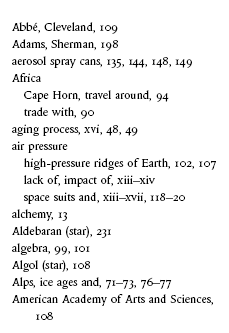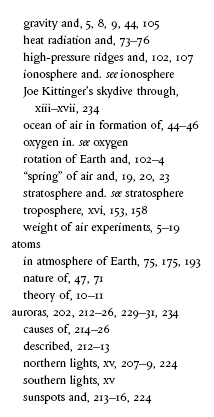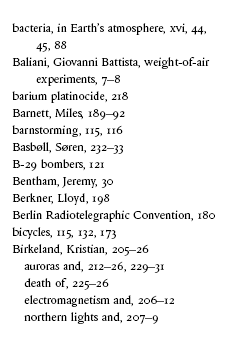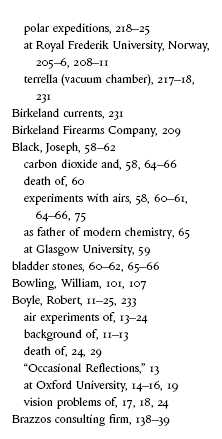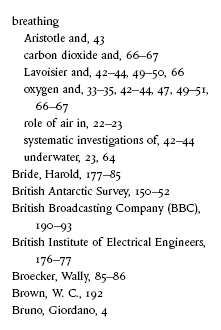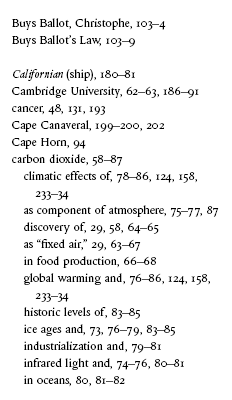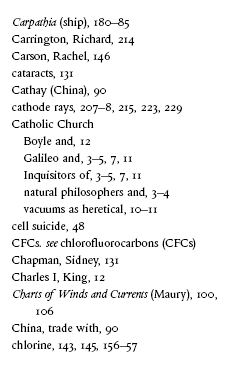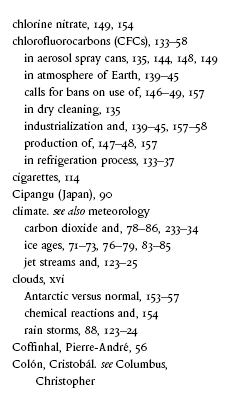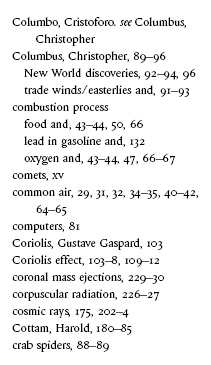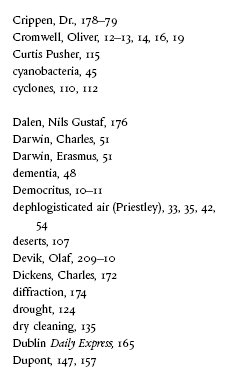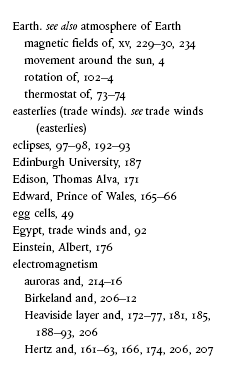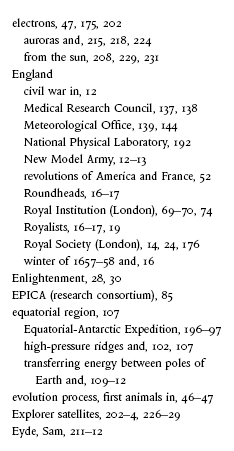An Ocean of Air (41 page)
Authors: Gabrielle Walker

[>]
on 4 successive days
Nahin,
Oliver Heaviside, Sage in Solitude,
p. 292.
[>]
A lady for protection allowed
Ibid., p. 292.
[>]
regarded it particularly seriously
One contemporary commentator joked that, rather than facing years of isolation, any modern Robinson Crusoe would simply need to fire up his ship's wireless apparatus, "call up the nearest stations and ships, and pass the time waiting for relief in listening to the latest stock exchange quotations." See Francis A. Collins,
The Wireless Man, His Work and Adventures on Land and Sea
(New York: The Century Company, 1912), p. 118. A few years earlier, two ships had collided, and one of them, the
Republic,
eventually sank. Help arrived thanks to a wireless distress signal, but all passengers had already been transferred to the remaining ship, the
Florida,
which still managed to limp into port.
[>]
the hero of the hour
See Harrison's
The Story of the Ionosphere.
[>]
ninepence per word thereafter
Weightman,
Signor Marconi's Magic Box,
p. 230; this was the modern equivalent of nearly sixty dollars for the first ten words and nearly four dollars a word thereafter.
[>]
recognize in Morse code
"SOS" is a simple (dot dot dot/ dash dash dash/ dot dot dot), whereas "CQD" is the more complex (dash dot dash dot/dash dash dot dash/ dash dot dot).
[>]
nobody else would spot
Francis A. Collins,
The Wireless Man
(New York: The Century Company, 1912), p. 14.
[>]
he was not moving
New York Times,
April 28, 1912.
[>]
my eyes on things above
Dunlap,
Marconi: The Man and His Wireless,
p. 188.
[>]
Phillips is dead," he said
One of the messages in Bride's pile was from Jack Thayer's mother. His father had disappeared with the
Titanic.
Mrs. Thayer's message had read: "Let anyone meet us but not children. Hope gone." The message was never sent. See Booth and Coughlan,
Titanic: Signals of Disaster.
[>]
she was postponing the trip
Degna Marconi,
My Father, Marconi,
p. 190.
[>]
four times their annual salaries
Bride gained $1,000 and Cottam, $750. Each was earning about $350 per year; see Weightman, p. 257.
[>]
even bigger and finer than this
Clark,
Sir Edward Appleton,
p. 9.
[>]
the silver and gold plate
At this early stage in his career, there was no college silver for Appleton on the breakfast table. Nor was there fancy accommodation. During the war, he had married a woman from Bradford, and when his new wife first saw the unprepossessing terraced house that he had rented for them in Cambridge, she burst into tears.
187
he got it—nearly all round
Clark,
Sir Edward Appleton,
p. 21.
[>]
cup bearer to the gods
Ratcliffe,
Biographical Memoirs,
p. 7.
[>]
seemed to have taken away
This was at a presidential address to the British Association in the 1950s. See Clark,
Sir Edward Appleton,
p. 45.
[>]
a captured pill box
Ratcliffe,
Biographical Memoirs,
p. 9.
[>]
for almost inconceivable distances
Collins,
The Wireless Man,
p. 100.
[>]
Appleton and Barnett set up their equipment
This was only a few months before Oliver Heaviside's death.
[>]
was done on tea and sausage rolls
Appleton, quoted in Clark,
Sir Edward Appleton,
p. 54.
[>]
continually bombard our fragile planet
This crackling region of air also turned out to be more complicated than anyone had realized. Appleton had named Heaviside's invention the E-Layer, to stand for electricity. But he later found another one higher in the sky, which he called F and most other people called the Appleton Layer, and then another, flimsier, one that lay below the E-Layer, and naturally came to be known as D. (Appleton explained: "I didn't use the letters A, B, or C because I felt I must leave a letter or two in case someone discovered other layers below the D-Layer. They haven't done so, so now it looks a bit off to start with the D-Layer. However I admit it's my fault.") See Clark,
Sir Edward Appleton,
pp. 60–61.
[>]
received the Nobel prize for physics
During his lecture at the ceremony in Sweden he told an elegant little joke to amuse the assembled guests. They should not, he said, place too much faith in the scientific method. For there was once a scientist who fed his friends a drink made up of whisky and soda water, and carefully observed the results. The next night he fed the same friends rum and soda water, and the next night gin and soda water. On each occasion, the friends got drunk. The scientist concluded that the agent responsible for this must have been the one thing the drinks had in common: soda water. The story went down well. Appleton didn't discover until later that the Crown Prince, later King Gustavus VI Adolphus, who was seated next to Lady Appleton, drank nothing but soda water.
[>]
escape into the upper atmosphere
Clark,
Sir Edward Appleton,
p. 45.
CHAPTER
7
[>]
give us the green light and sixty days
Green and Lomask,
Vanguard: A History,
chapter 11, p. 8 (Web version).
[>]
whale oil to make solid margarine
Birkeland was amazingly prescient—he would also try to raise funds to work on methods to exploit atomic energy before most of the world had even dreamed of this. Modern atomic theory didn't yet exist, and few people realized that atoms could be subdivided. But in 1905, Einstein published his famous paper on special relativity showing that mass was just another form of energy, and Birkeland made the connection that would later give rise to both the nuclear power station and the nuclear bomb. In 1906 he wrote to a Swedish banker: "The problem I propose to solve is to find a practical way to utilize atomic energy. Our most important energy sources are stored in the molecules. If we solve this problem, we can get more energy out of one kilogram of matter than we get out of 10,000 kg of coal today." See Egeland and Burke,
The First Space Scientist,
p. 127. Birkeland said he realized the problem was difficult and admitted it might not work, but added: "I have never had such a mind to take up a thing as I have with this problem." Unfortunately, in this case he didn't get his money. The banker called his idea "titanic" and "alluring," but said that he needed to wait for Birkeland's other inventions to turn a profit. See, for example, Devik, "Kristian Birkeland as I knew him," p. 5.
210
latest miscalculation on the blackboard
Egeland,
The Man and the Scientist,
p. 14.
[>]
exchange from 300 down to zero
Devik, "Kristian Birkeland as I knew him," p. 3.
[>]
he explained his idea to Eyde
Devik poetically wrote that Birkeland became "all fire and flame."
[>]
noses and complained of the smell
Birkeland's furnace was eventually supplanted by the Haber process, which is the modern basis for nitrogen fertilizers and involves splitting nitrogen by means of an iron catalyst. But for several decades, his sparking furnace reigned supreme.
[>]
of such a sinister sight
Brekke and Egeland,
The Northern Lights,
p. 111.
[>]
noiseless kneading of a cat's paws
There have been persistent reports that auroras are accompanied on rare occasions by a hissing sound. Though this has been rubbished by scientists for years, recent research suggests there may be something in them. See Harriet Williams, "Sizzling Skies,"
New Scientist
(January 6, 2001), p. 14.
[>]
traveled some 35,000 miles
"Carrington's Flare," at
www.istp.gsfc.nasa.gov/Education/whcarr.html
.
[>]
one might say excessive—6,638 readings
See, for instance, Jago,
The Northern Lights,
p. 23.
[>]
concentrate wholly on work
Egeland and Burke,
Kristian Birkeland: The First Space Scientist,
p. 134.
[>]
all went flying off the table
Jago,
The Northern Lights,
p. 172.
[>]
that is possible for me to give
Ibid., p. 199.
[>]
A moment later it was gone
Ibid., p. 118.
[>]
seemed the surest way of trying
He had also decided to try to measure the heights of the auroras by recording them from two adjacent mountaintops connected by telephone lines. He had hoped that if each team took a picture of the same aurora at exactly the same time, but from a slightly different position, simple geometry should tell him how high the lights were. However, his cameras didn't work properly, so the idea came to nothing.
[>]
in the face of the wind again
Birkeland,
The Norwegian Aurora Polaris Expedition 1902–1903,
p. 3.
221
dreams of becoming a surgeon
Note: In spite of his handicap, he did, however, become a world-famous oceanographer.
[>]
the fjord like a dark channel
Birkeland,
The Norwegian Aurora Polaris Expedition,
p. 5.
[>]
the storm outside by the noise within
Ibid., p. 6.
[>]
I'm too stupid to be frightened
Ibid., p. 9.
[>]
the heating pipes were ceramic
See Egeland and Burke,
Kristian Birkeland: The First Space Scientist.
[>]
entirely absorbed by the atmosphere
Birkeland,
The Norwegian Aurora Polaris Expedition,
section 1, preface, and section 2, p. 608.
[>]
periods has been mere coincidence
See, for instance, Jago,
The Northern Lights,
p. 81.
[>]
such a mighty attraction on him
Ibid., p. 267.
[>]
voice of reason in a world gone mad
Martin Walt in "From Nuclear Physics to Space Physics by Way of High Altitude Nuclear Tests," p. 255, in "Discovery of the Magnetosphere,"
History of Geophysics.
[>]
were in no way intimidated
"Energetic particles in the earth's external magnetic field," by James Van Allen, p. 235 in "Discovery of the Magnetosphere,"
History of Geophysics.
[>]
flickering lights of the auroras
Protons do this, too, but the auroras they make are not visible to the naked eye.
[>]
our protective air is doing its job well
The system even works for astronauts. Missions such as the space shuttle don't fly as high as you might think, and apart from the Apollo missions, every human space flight has taken place beneath the shelter of our atmosphere's outermost protective layer. Between
Apollo 16
and
17
came a solar outburst massive enough to give any lunar astronauts a lethal dose of radiation within ten hours. Fortunately, no one happened to be flying. Any future human space flight back to the moon, to Mars, or anywhere else outside the air's aegis would have to be very heavily shielded.
[>]
are replaced by new ones
The inner Van Allen belt is populated with protons that come from cosmic rays, rather than from the sun.
[>]
Birkeland currents in his honor
He was slightly wrong about these—though there are indeed vertical and horizontal currents in the atmosphere, the ones whose influence he measured were only off-shoots of the real things. But nobody has felt the need to quibble, and the name stands.
[>]
planted a fingerprint on the spacecraft
Christine Hallas, "The James Van Allen Papers."
